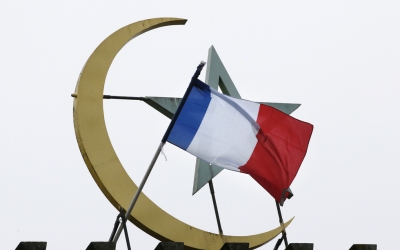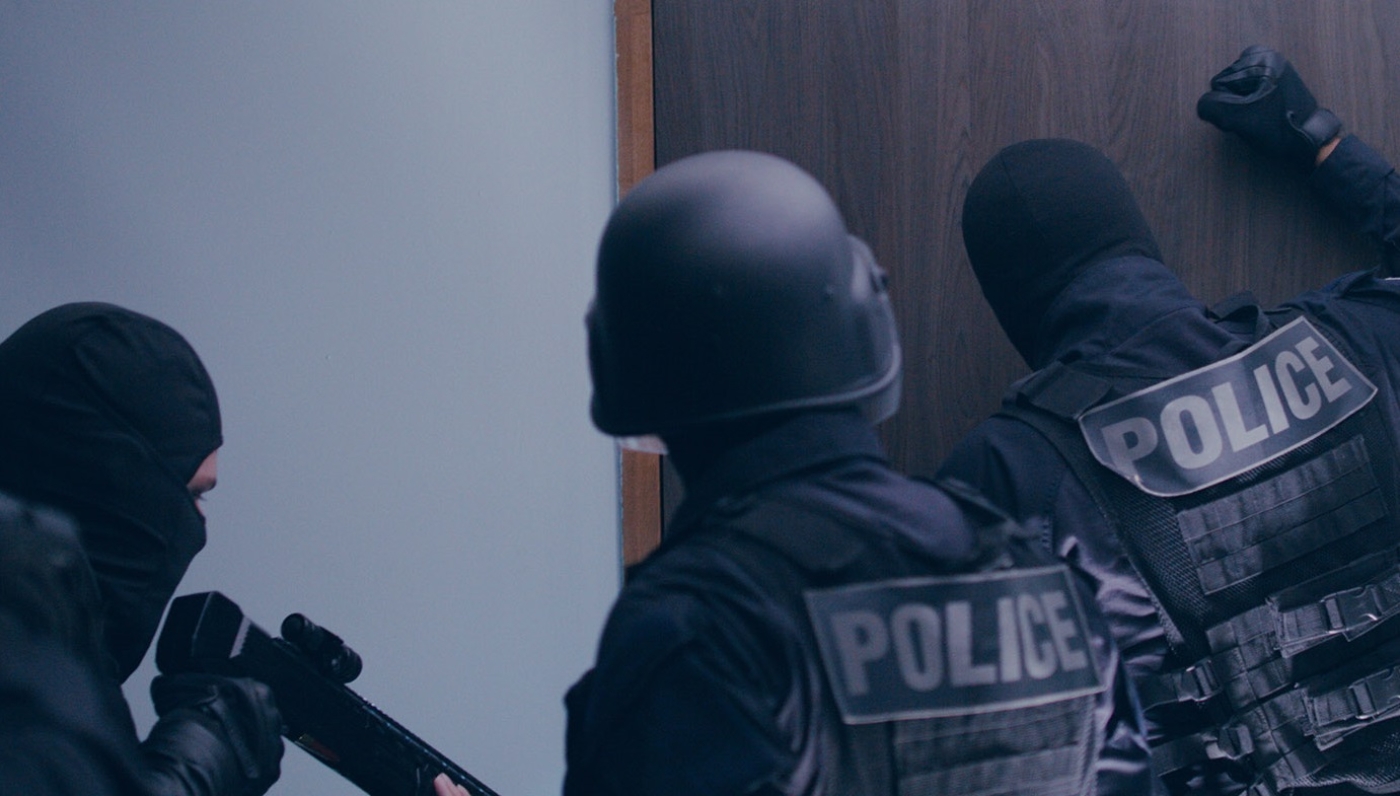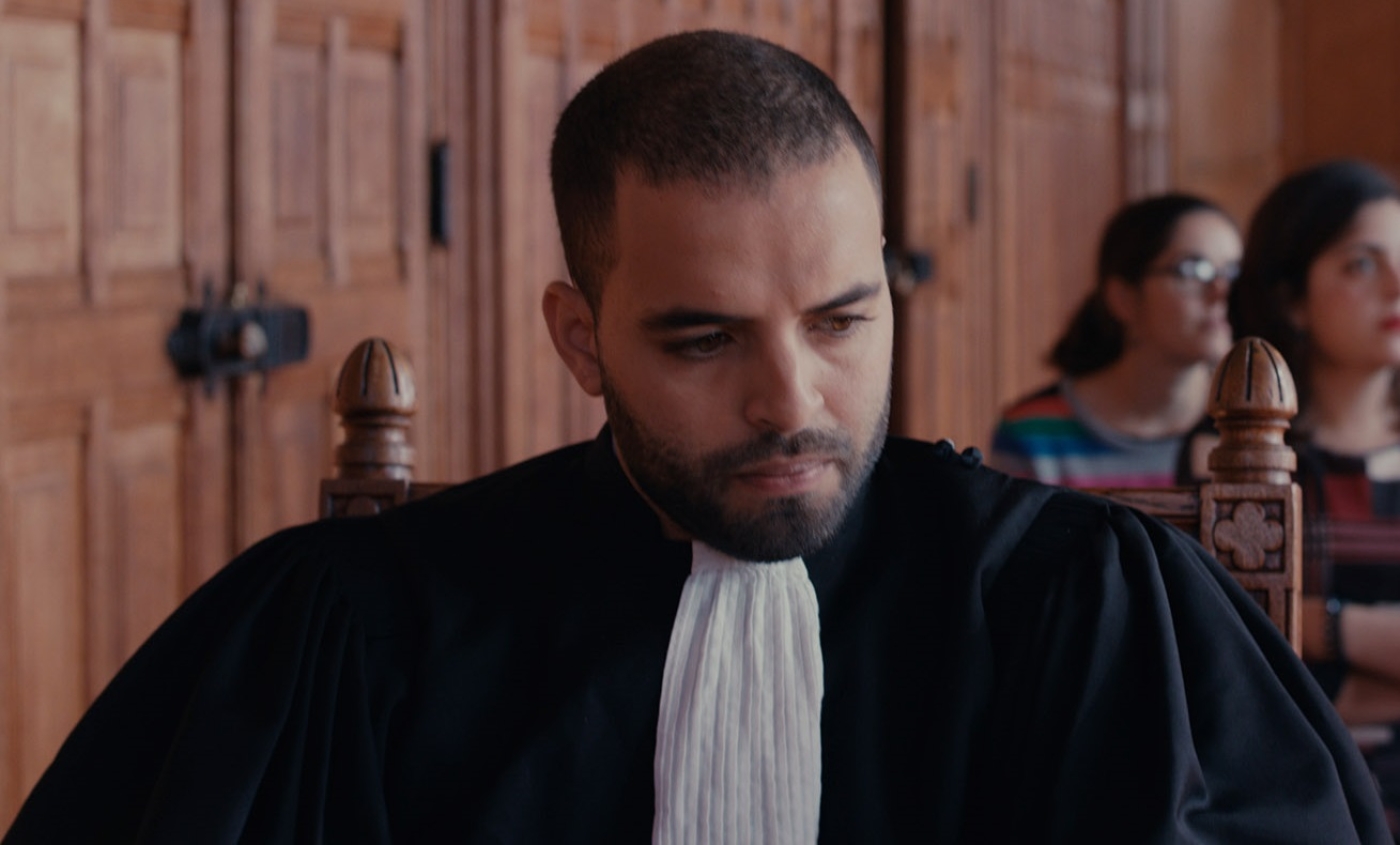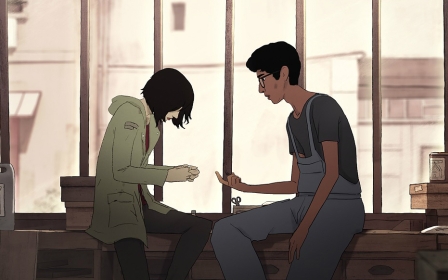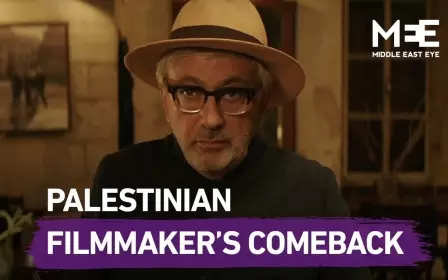How France's post-terror crackdown inspired film
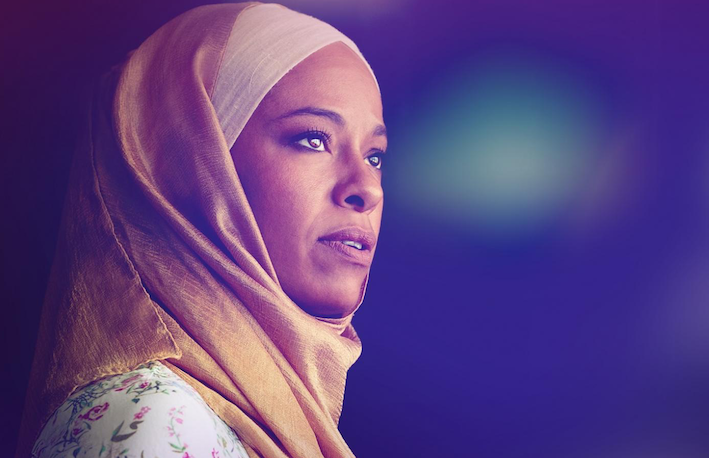
It's the first film to examine the impact of the state of emergency imposed in France following the November 2015 attacks in Paris. But Soumaya, by directors Ubaydah Abu-Usayd and Waheed Khan, has weathered criticism, the lack of a distributor and even what the film-makers describe as "censorship".
Soumaya (Soraya Hachoumi), a practising Muslim and the mother of a young girl, works as a manager at a company in charge of security at Charles de Gaulle Airport. But her life is disrupted when law enforcement officers raid her home and she finds herself out of a job.
New MEE newsletter: Jerusalem Dispatch
Sign up to get the latest insights and analysis on Israel-Palestine, alongside Turkey Unpacked and other MEE newsletters
Anonymous complaints, made by an envious co-worker, prompt the police to forcibly enter, search and ransack Soumaya’s apartment. Her religious beliefs, the headscarf she never wears to work, and her security badge - allegedly lent to a colleague who is also under investigation - are all enough to make her a suspect.
Abu-Usayd and Khan use this scenario to explore the personal, professional and legal battles Soumaya faces in a nation under the state of emergency, which give police the right to search homes and make house arrests without a warrant.
Based on a true story, the narrative unfolds as a series of portraits, both archetypal and realist: the worried mother urging her daughter not to make waves; the luggage handler who has rediscovered his faith through his wife who has converted to Islam; the lawyer of immigrant descent, torn between his desire to fully integrate into French society and the injustices he sees all around him; and the imam whose mosque is searched on the basis of slender evidence. As such, Soumaya is an unprecedented look at the state of emergency in France from the viewpoint of the victims, whose experience often goes unacknowledged.
Middle East Eye asked Abu-Usayd and Khan what inspired them to make Soumaya as well as about the controversy that has surrounded it.
Another world
Middle East Eye: How did you come up with the idea for the film?
Ubaydah Abu-Usayd: A year after the state of emergency was declared, I was asked to do a film interview with a woman whose home had been searched. She was a Muslim, raising a daughter on her own, like Soumaya in the movie. Her story shocked me at the time. It dawned on me that I really knew very little about what had gone on in France under the state of emergency, that I hadn’t realised the direct impact it had had on the lives of families and individuals.
The press gave an overly simplistic vision of events at first. There were no accounts of homes being searched, of people being placed under house arrest, other than from advocacy groups and alternative media sources.
Waheed Khan: The woman’s story was quite simple in fact, but the emotional impact of what she went through was obvious. I thought it’d be interesting to capture her story from an angle other than that of a straightforward testimonial or account. Fiction based on fact seemed to be an interesting approach. It started off as a series, but the idea of a feature film rapidly emerged.
MEE: Why do you say you were not aware of what was happening in France under the state of emergency?
UAU: What I mean is that although I had heard about the situation, I hadn’t considered it from the viewpoint of the people who had experienced it first-hand. More than 4,000 people had their homes raided, including 2,500-plus in the month immediately following the 2015 November attacks. But only a few cases made the news.
We were unaware of how it affected their lives and the lives of their children, spouses, friends and co-workers. We knew what was happening – and yet we didn’t. The mechanism that saw a portion of the population suddenly pigeonholed as dangerous also raised questions.
MEE: Why did you choose to make a fictional account?
WK: In our view, quite simply, it was the best way to breathe life into the main character, to capture the story of a woman caught in a reality beyond her control. Fiction allowed us to address other issues as well, such as Soumaya’s relationship with her mother and her brother, her co-workers and her religion.
We stuck to a chronological account of the charges of radicalisation brought forward during the trial to tie the narrative together and bring home the reality of what happened to Soumaya and to so many people in France.
The case for the defence
MEE: Is Soumaya typical of the people who were subjected to police raids? In your film, she is what could best be described as a successfully integrated immigrant, the head of a department who speaks perfect French. She is able to defend herself and is not intimidated by the administration or the court.
UAU: I’m not an expert, so I couldn’t say. But Soumaya is not unlike people I know and work with. I co-wrote the screenplay with my wife, who, as a manager herself, has had to face difficulties like the ones facing Soumaya.
But there are other characters who, unlike Soumaya, are unable to stand up for themselves. They are from more vulnerable sectors of the population, such as her colleague, the baggage handler, and the imam as well. Both bitterly feel the consequences of the state of emergency.
WK: I have a background in fiction, so that’s how I approached the story – as fictional. But the scope of the state of emergency and the number of people targeted as potential threats almost overnight came as a surprise to me. I saw it as a powerful message, a human-interest story that needed to be told using a classical style of filmmaking.
We also had to deal with budget constraints. The film is quite an achievement, considering the challenges involved: the actors were worried about their careers, given the subject matter.
But we are happy with what we’ve accomplished, however. We spoke to people at screenings who were affected by the state of emergency: they said that the film faithfully recounted what they had been through and, more importantly, that it marked a turning point.
Kicking against stereotypes
MEE: How did you finance the film?
UAU: I’ve worked in the film industry, so I know how the financing circuit works. Often this means only presenting projects that conform to certain long-established models predominant in French film, such as the image of the devout Muslim represented as either an ignoramus or a threat to society.
That’s the simplistic but omnipresent vision in both French and Hollywood productions that I want to confront. One striking example of this is the Dardenne brothers’ most recent film, Young Ahmed, which portrays a fervently religious teen with whom it is literally impossible to communicate.
WK: We managed to make the film on a shoestring budget by doubling down, which means that we were involved at once in the writing, shooting, editing and direction.
We began by launching a crowdfunding campaign, with the technical support of the CCIF (Collectif Contre l'Islamophobie en France). Unfortunately, the campaign didn’t meet our goals, but a CCIF donor, who has asked to remain anonymous, thought our project was worthwhile. A good part of the expenses were covered that way and, better yet, there were no strings attached. The financial backer in question saw the film at its first showing, along with everyone else.
The rest was made possible by our actors’ generosity and our crew’s versatility, along with additional displays of solidarity. Many people realised how important the film was, that Soumaya would provide another perspective. Perhaps this explains, in part, the difficulties we had with its financing and screening.
MEE: Are you referring to the cancelled screening at the Grand Rex in Paris?
UAU: We had booked the Grand Rex for a preview screening in December 2018. An agreement in principle had been reached and an advance deposit had been made. The managers of the theatre had only asked for the film’s synopsis and title.
But when the trailer was released in February, online extreme-right communities – termed the “fachosphère” in France – got all worked up. A few days later we received a formal cancellation notice from the Grand Rex, along with [the return of the] advance deposit.
When we called the theatre manager, he told us the Grand Rex did not schedule independent films – which is not true. Moreover, in our case, it was a private screening, so we could have shown anything we wanted, even home movies.
When the matter was taken to the courts, we discovered the real reason behind the cancellation: the Grand Rex refuses to schedule films “of a political or religious nature”. In our view, this is the very definition of censure.
MEE: Do you think the backing of the CCIF could have played a part in the decision?
UAU: I would have had no problem with the film having been backed by another NGO, such as the Human Rights League or Amnesty International. So, whenever the issue comes up, I turn the argument around by asking where the real problem is.
The CCIF was very close to the individuals impacted by the state of emergency. This is still the case today, for that matter.
We were given total artistic freedom. And then, the person who financed the film only saw it once it was finished, at the press screening along with the journalists. The subject of the state of emergency in France hasn’t been properly addressed yet, and if this film is qualified “militant”, then so be it – or so much the better.
WK: We were amazed by the film’s reception. Members of the audience were moved to tears. That in itself is something to be happy about. It’s been hard, of course. We still don’t have a distributor, and there are problems, like what happened with the Grand Rex - but the film is made.
Not all the media showed up for the critic screenings, but when they did, they were enthusiastic. Of course, some people accused us of being “irresponsible”. Fachosphère groups lambasted us. We’d made a tearjerker, they said, to accuse France of targeting Muslims.
Yet what we simply wanted to say was that the victims of the state of emergency have been forgotten and that the French judicial system has suffered from the injustices committed at the time as well. The Gilets Jaunes movement has brought the issue back to the fore to a certain extent because other non-Muslim populations have been affected by the arbitrary measures.
We were interested in more than just the state of emergency. We wanted to show another aspect of the Muslim community in France, to portray more than the stereotypes and fantasies. We also chose to subtitle the film in English, to reach audiences in other countries, both English-speaking and Arabic. We see it as educational. We want the film to make a positive impact, to take a nuanced approach to an unnuanced topic.
Complexity of thought
MEE: You chose to depict a Muslim community fully integrated into French society and struggling with generational conflicts, especially between Soumaya and her mother.
UAU: To be perfectly honest, my parents and Waheed’s parents reacted exactly like Soumaya’s. They thought a film like this could be bad for our careers. It was better to keep quiet when it comes to such matters – exactly what Soumaya’s mother says when her daughter decides to take the issue to court to defend her rights.
'We needed to show how radicalisation takes root in social and political contexts, and that attributing it to religious factors alone is overly simplistic'
- Ubaydah Abu-Usayd, director
Muslims in the film are portrayed as complex and multi-layered individuals. To us, complexity means the right to change your mind – a far cry from the cliché of a Muslim block determined by culture and faith alone. Muslims are individuals dealing with social and psychological realities, and family ties.
MEE: One of the film’s more emblematic scenes is the faceoff between Kais (Khalid Berkouz), Soumaya’s lawyer, and a baggage handler whose home was raided because he prays during break. The baggage handler says that French foreign policy is partially responsible for the attacks committed on French soil, a position Kais condemns as a justification of terrorism…
UAU: The idea was to highlight the complexity of the problem. When Michel Onfray, the French writer and philosopher, told the writer and film director, Yann Moix, on primetime TV that what was happening in France was the “neo-colonialist” result of - and I quote - “Islamophobic foreign policies slamming Muslims around the world”, nobody called it a justification of terrorism. For once, he’d said something pretty much on the mark, yet when a Muslim uses the same argument, he is accused of justifying the attacks.
We needed to show how radicalisation takes root in social and political contexts, and that attributing it to religious factors alone is overly simplistic.
There’s nothing sentimental about Soumaya: she is a fighter. She rejects hatred and stands up for her rights. Soumaya sums it up nicely during the trial: “I am not the victim here, you are,” she says, addressing the members of the court and the people in the room. This is also what the film is about, about the fact that the state of emergency has damaged French society and the nation’s social cohesion as well.
Soumaya is being released in French theatres on 5 February, 2020. Check the website for updated details.
This article is based on content originally published in French at Middle East Eye.fr
Middle East Eye delivers independent and unrivalled coverage and analysis of the Middle East, North Africa and beyond. To learn more about republishing this content and the associated fees, please fill out this form. More about MEE can be found here.


